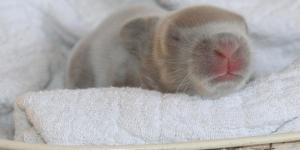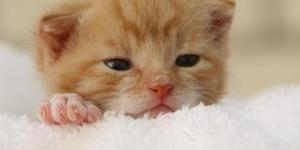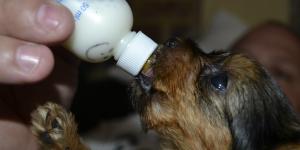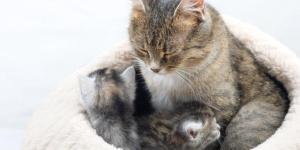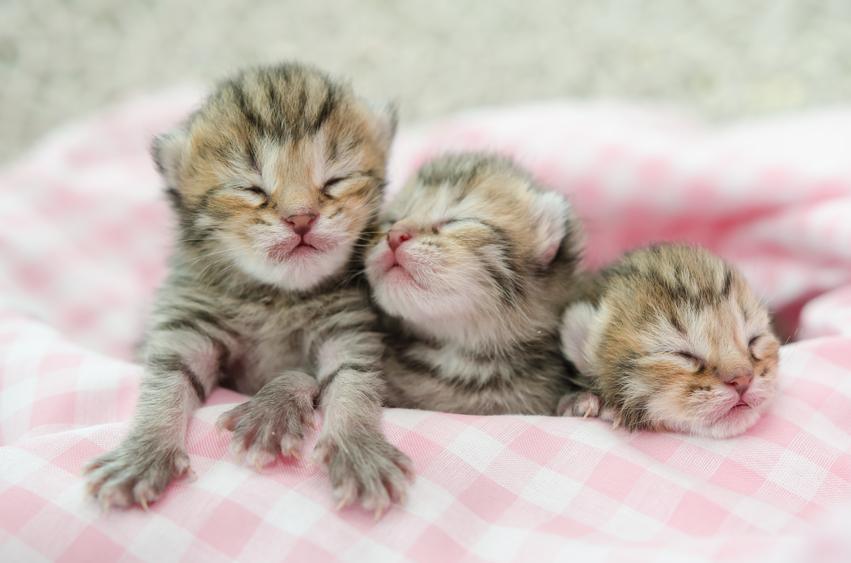How to Feed a Newborn Kitten

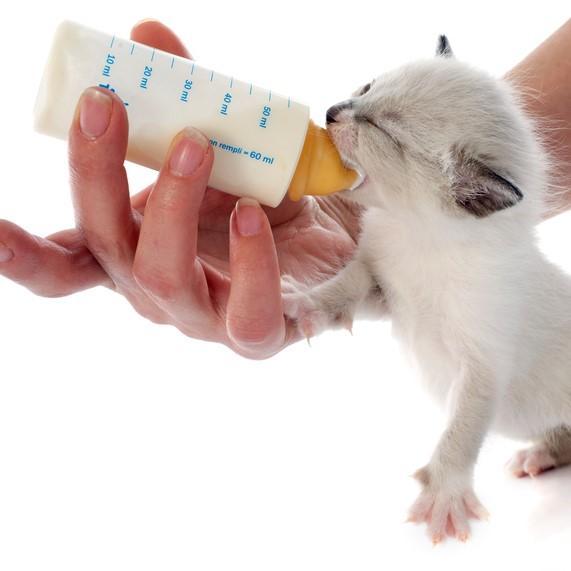

See files for Cats
A kitten should stay with their mother and drink their milk up to 8 weeks after birth, even 10 weeks, before being adopted: nothing replaces their mother to give them the nutrients they need and the care that will allow them to have the best socialization and a good immune system development. Ideally it is recommended for the kitten to stay with their mother until their 12 weeks of age before their adoption.
But you must watch the kittens and check that they are growing and increasing in weight at an adequate pace: it may not be the case, and you may have to feed them yourself.
If the mother has died or if you've found an orphan kitten you have to feed, read this AnimalWised article to know how to feed a newborn kitten.
The hydration newborn kittens need from their mother
If the kittens have their mother she will be in charge of feeding them: she should breastfeed them at least until 8 weeks old.
Normally all water needs should be covered in their entirety by breast milk during the first weeks. Any factor that prevents normal breastfeeding will lead to rapid dehydration. This is why we must make sure that all the kittens are breastfeeding correctly, especially in the case of big litters, also you must check that they are gaining weight adequately.
The room humidity is a parameter that you should control: the relative humidity must be between 55-65%, especially when cats are away from their mother. To do this you can simply place a few bowls with water near the nest to keep the oral and respiratory mucous membranes of the kittens hydrated.
If the relative humidity falls below 35% the risk of hygromerty is very high.
Hygrometry should not exceed 95% because this could cause shortness of breath, and the easy development of micro-organisms due toa high humidity environment. But in the case of premature or weak kittens it can be interesting to maintain a relative humidity of 85-90%: This reduces water loss by evaporation at the level of the mucous membranes and reduces heat losses.

Signs of malnutrition in a newborn kitten
A kitten in good health will sleep between breastfeeding sessions and will wake up when their mother encourages them to so, when they start to scream and actively seeks the teat.
When meals are not enough cats wake more frequently and moan. They progressively become inactive and do not gain enough weight. The most frequent complications from malnutrition are diarrhea, dehydration, hypoglycemia, and hypothermia.
Any kitten that is under-fed or rejected by their mother must be assisted quickly.

Kitten's weight
Birth weight is an important factor of diagnosis: is has been determined that a low weight at birth is correlated with the severity of the diseases in the newborn. A study shows that 59% of born dead or cats that die some days after birth had low weight at birth.
If the cat received an inadequate power to your physiological state during gestation, the weight of the kittens may be affected.
Kittens with a low birth weight have a higher metabolism and higher energy needs: are more predisposed to hypoglycemia.
To preserve the data, we recommend that you take a note of the kitten's weight each day, at least during the first 2 weeks of age.
The normal birth weight of a kitten is between 90-110 grams, and he should win 15 - 30 grams each day during the first month (in any case a minimum 7 - 10 grams per day) and it should have reached double their birth weight at the age of 14 days : their weight goes up about 50 to 100 grams per week. Whether they are male or female does not influence their weight gain during the first weeks.
Weight loss may be acceptable if it does not exceed the daily 10% and if it only affects a limited number of kittens. On the other hand if all the litter lost weight the cause must be found quickly.
If the weight of a kitten diminishes every day, the food is probably insufficient or of poor quality: a complete examination of the mother should be in search of a mastitis, a metritis or other conditions that may have a harmful influence on the production of milk.
A kitten that loses weight for 24 to 48 hours or that stops putting on weight for 2 or 3 days must necessarily receive a dietary supplement, results are more favorable if you start with a supplement at the beginning of the weight loss.
The correlation between a kitten's age and weight when it comes to growth from birth up to 8 weeks is the following:
- Birth: 90-110 grams
- 1st week: 140-200 grams
- 2nd week: 180-300 grams
- 3rd week: 250-380 grams
- 4th week: 260-440 grams
- 5th week: 280-530 grams
- 6th week: 320-600 grams
- 7th week: 350-700 grams
- 8th week: 400-800 grams
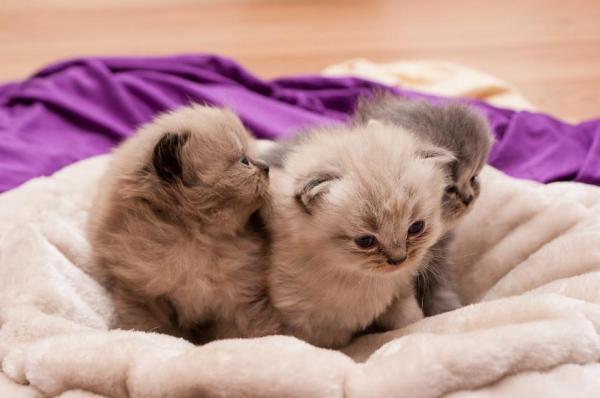
For malnourished or orphaned kittens: artificial feeding
Artificial milk
Artificial milk should be the food that best meets a kitten's needs. The energy requirements of the kitten are estimated to about 21-26 kcal per 100 g of body weight.
A kitten that had a mother would receive the colostrum in their first hours of life: its use is not only to give nutrients to the newborn kitten, but also to provide passive immune defenses by transmitting immunoglobulins. Therefore in the first days of their life we must give them a substitute which will fulfill the same functions as colostrum. Colostrum is produced by the mother cat physiologically during the first 24 to 72 hours of lactation, then she produces the milk.
Rate of distribution
The number of recommended food to give a kitten each day is difficult to discern. Kittens tend to effectively absorb milk in small amounts, but in numerous shots: up to 20 per day. The pace of distribution of kitten milk replacement should be regular, not more than 6 hours between two shots.
But it must be long enough for the stomach to have time to empty: about 3-4 hours and carefully respecting the kitten's rhythm as much as possible. In actual fact, waking them up too frequently can cause stress. We recommend 4 to 8 shots per day, separating them about 3-6 hours.
Usually, even if the conditions are favorable and you feed them well with the right artificial feeding, kittens tend to have growth retardation. This delay should not exceed 10% and should be compensated during weaning.
The stomach capacity of a newborn is about 50 mL/kg, usually a single kitten absorbes about 10-20 ml of milk, so the concentration of the replacement milk is essential to meet the kitten's needs.
If the energy density of the lacto-alternative is too low, we will have to increase the number of shots given. In this case to meet their nutritional needs, we will create an excess of fluid which can affect the water balance and damage to the kidney. On the other hand, if the milk replacement is too energetic or if we give the kitten too much, you may have osmotic diarrhea or other digestive disorders.
Milk
The natural composition of the milk of the mother cat changes within 72 hours after birth and starts to produce milk itself instead of colostrum. The milk will be the only nutritional contribution that the newborn kittens will need until weaning. You can use TVM formula, for example.
The milk formula should be prepared just before administering it to the kittens and should be distributed to the kittens in syringes and sterile nipples, it is also better for each kitten to have their own linchpin. It is advisable not to prepare the milk beforehand but if it were necessary, you should keep it in the fridge at a temperature of 4 ° C (39° F), and never more than 48 hours. The milk should be given at a temperature of 37 - 38° C (98.6 -100°F), it's better to heat a warm water bath (bain maire) because if you heat it up in the microwave very hot liquid bubbles and other very cold ones will form.
When cats accept sucking from the bottle's teat it's the perfect situation: the kitten will stop sucking when they have had e enough milk. But the kitten should have a suction reflex for bottle feeding or else it may cause swallowing problems.
Syringes are more suitable for kittens less than 4 weeks because the feeding bottle teats are often too big for them or have a high liquid drip.
Between 1 to 3 weeks of life, kittens need two tablespoons for each 110 grams of weight every 2 to 3 hours.
To feed the kitten, place them in the same position that they would have if their mother gave them milk: hold the kitten with their head high and belly on a towel, let them suck over and over again but do not give him too much. You must be quiet when they eat so that they feel confident, and let them take their time to breastfeed to avoid digestion problems or that you eat too much food.
Once completed breastfeed keep the kitten lying on her back and gently caress her belly: if he were with his mother, this will lamería the belly or the genital area to stimulate them to empty their bowels of solid or gaseous form. This step is very important.
Then, re-position the kitten in their nest so they can cuddle and relax, keep on feeding them until weaning starts and progressively introduce another type of food.
You should usually start to add solid feed at 4 weeks but some cats feed exclusively on milk until 8 weeks, which is why should consult a veterinarian to determine the ideal weaning time and meet your young kitten's needs.

If you want to read similar articles to How to Feed a Newborn Kitten, we recommend you visit our Lactation category.
Tips
- If you have newborn kittens, and even more so if you're going to have to take care of breastfeeding, we strongly advise you to consult your veterinarian.

